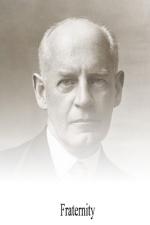Mr. Purcey smiled. When he smiled his cheeks formed two hard red blocks, his trim moustache stood out, and many little wrinkles ran from his light eyes.
“Chock full of them,” he said; “least thing upsets me. Can’t bear to see a hungry-lookin’ child, or anything.”
A strange feeling of admiration for this man had come upon Cecilia. Why could not she, and Thyme, and Hilary, and Stephen, and all the people they knew and mixed with, be like him, so sound and healthy, so unravaged by disturbing sympathies, so innocent of “social conscience,” so content?
As though jealous of these thoughts about her master, the A.i. Damyer stopped of her own accord.
“Hallo,” said Mr. Purcey, “hallo, I say! Don’t you get out; she’ll be all right directly.”
“Oh,” said Cecilia, “thanks; but I must go in here, anyhow; I think I’ll say good-bye. Thank you so much. I have enjoyed it.”
From the threshold of a shop she looked back. Mr. Purcey, on foot, was leaning forward from the waist, staring at his A.i. Damyer with profound concentration.
CHAPTER IX
HILARY GIVES CHASE
The ethics of a man like Hilary were not those of the million pure bred Purceys of this life, founded on a sense of property in this world and the next; nor were they precisely the morals and religion of the aristocracy, who, though aestheticised in parts, quietly used, in bulk, their fortified position to graft on Mr. Purcey’s ethics the principle of ‘You be damned!’ In the eyes of the majority he was probably an immoral and irreligious man; but in fact his morals and religion were those of his special section of society—the cultivated classes, “the professors, the artistic pigs, advanced people, and all that sort of cuckoo,” as Mr. Purcey called them—a section of society supplemented by persons, placed beyond the realms of want, who speculated in ideas.
Had he been required to make confession of his creed he would probably have framed it in some such way as this: “I disbelieve in all Church dogmas, and do not go to church; I have no definite ideas about a future state, and do not want to have; but in a private way I try to identify myself as much as possible with what I see about me, feeling that if I could ever really be at one with the world I live in I should be happy. I think it foolish not to trust my senses and my reason; as for what my senses and my reason will not tell me, I assume that all is as it had to be, for if one could get to know the why of everything in one would be the Universe. I do not believe that chastity is a virtue in itself, but only so far as it ministers to the health and happiness of the community. I do not believe that marriage confers the rights of ownership, and I loathe all public wrangling on such matters; but I am temperamentally averse to the harming of my neighbours, if in reason




